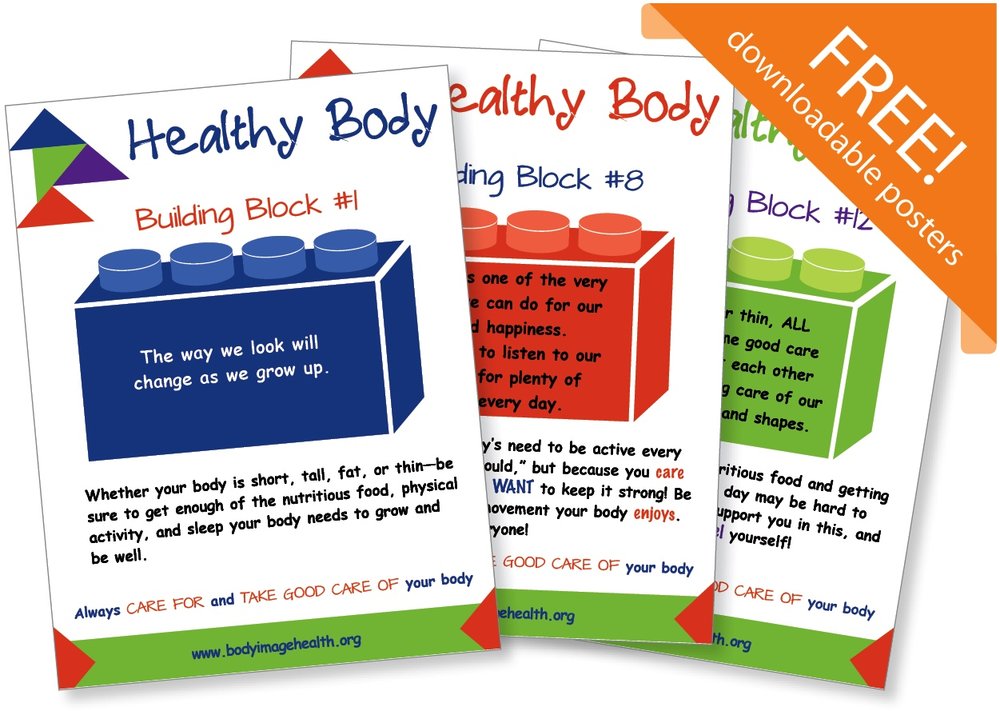New! Fully updated Third Edition of the former Healthy Body Image curriculum
Healthy Bodies; Teaching Kids What They Need to Know
Kathy Kater, LICSW
New! Free!
Scroll down for Healthy Body Building Block POSTERS
A Comprehensive Curriculum to Address Body Image, Eating, Fitness, and Weight Concerns in Today’s Challenging Environment
Challenging weight bias and stigma
Teaching kids to CARE FOR – instead of compare – their bodies.
—Published in association with the National Eating Disorder Association

“When I want to know how to talk to kids about their health and nutritional well-being, I read what Kathy has to say to them. Her words of wisdom resonate in today’s chaotic food environment. Could it be as simple as she says? Yes, it can be. Kathy helps erase the fear and confusion around eating. At the same time, she promotes a positive body image and high self-esteem for all kids. She has seen the results of stigmatizing bodies that are too fat, too short, too skinny, too tall...and she celebrates the fact that human beings come in a wide variety of sizes and shapes. She has a lesson to teach…not just to teachers and kids, but to all of us.”
Kids need help in today’s challenging environment to maintain body esteem, eat well and stay fit. While a disturbing number of children will suffer diagnosable concerns stemming from poor eating and fitness choices, well over half of all children—thin or fat, boys and girls alike—will learn at far too early an age to worry about and be dissatisfied with their body size and shape. Far from benign, children who are anxious about weight begin to view their bodies from the outside-in—objectifying and judging themselves harshly according to external standards. In the process, they disconnect from internal hunger cues that are perfectly attuned to what and how much their bodies need to eat, as well as the ways their bodies want to move naturally and joyfully in daily life.
These children are less able to care for their bodies; less able to make normal, sound, eating and activity choices, particularly in today’s challenging food and entertainment environment. Instead they are at great risk for a host of body image, eating, fitness and weight concerns that are extremely difficult to reverse once established. This detrimental situation affects ever-younger girls and boys as well.
As worry about weight, the drive to be thin, "weight control" and dieting for weight loss have consumed our population, the rate of fatness has only increased, along with health problems associated with poor eating and fitness. Too many still believe that promoting fear and distain of fatness can be helpful in motivating positive health choices – that the more socially undesirable it is to be overweight, the more this will somehow help. But studies now confirm the opposite: body dissatisfaction routinely leads to less healthy and more disordered eating, less physical activity, weight gain and diminished overall health. Campaigns that add to weight stigma and fear of fatness in hopes of “size prevention” or weight control have not only failed; they are part of the problem. Primary prevention is therefore needed to target the seedbed out of which the full spectrum of body image and weight-related concerns take root and grow. BodyImageHealth provides tools to help prevent, reduce, or reverse the influence of insidious risk factors that diminish the body esteem, well-being, and health of countless children today.
Parents, educators, medical professionals, legislators and others who care about health want to help. But how to do so without harming has never been more crucial. While much remains to be learned, enough is now known to stop many problems before they start. BodyImageHealth offers the Model for Healthy Body Image and Weight, a comprehensive, big picture approach to teach young and old to value health and resist pressures that promote negative body esteem and counterproductive lifestyle habits. This model is the basis for the new Healthy Bodies curriculum and the Healthy Body Building Blocks for developing children, but it is fully applicable and adaptable for promotion of health in any venue for teens and adults as well.
“Healthy Bodies teaches exactly what every child and adult needs today: the facts about body size diversity, the wrongness, destructiveness, and proven ineffectiveness of weight stigma, why "weight control" is a flawed approach to a healthy weight and contributes to weight gain, the importance of connecting to who we are from the inside out, trust in listening to our bodies, encouragement to value and pursue vitality and happiness (instead of size) as a goal, and how to care for our bodies through mindful eating, and enjoyable movement. These smart, evidence-based, compassionate, engaging lessons teach both educators and kids the essence of self-care. Fully aligned with the Health at Every Size principles described in my book of that title, this curriculum should be taught to every child, everywhere!” —Linda Bacon, PhD, author of Health at Every Size
“Kathy Kater’s Healthy Bodies curriculum is a marvelous breath of fresh air in a sea of misinformation and confusion. This latest edition of her book is the most comprehensive, compassionate, and practical science-based approach for helping children (and their teachers and parents) to navigate the tricky road towards positive body-esteem and well-being. The focus is on helping kids to distinguish between the realities of physical maturation and the rhetoric of cultural portrayals of “ideal” bodies, make physical activity fun and accessible, and learn to eat according to innate, internal hunger and appetite signals. Incorporating the lessons contained in this book into the school curriculum will go a long way towards helping our kids to grow up feeling good about themselves by taking the best possible care of the wonderful and diverse bodies they have been given.” —Jon Robison, PhD MS, Department of Physiology, Michigan State University



